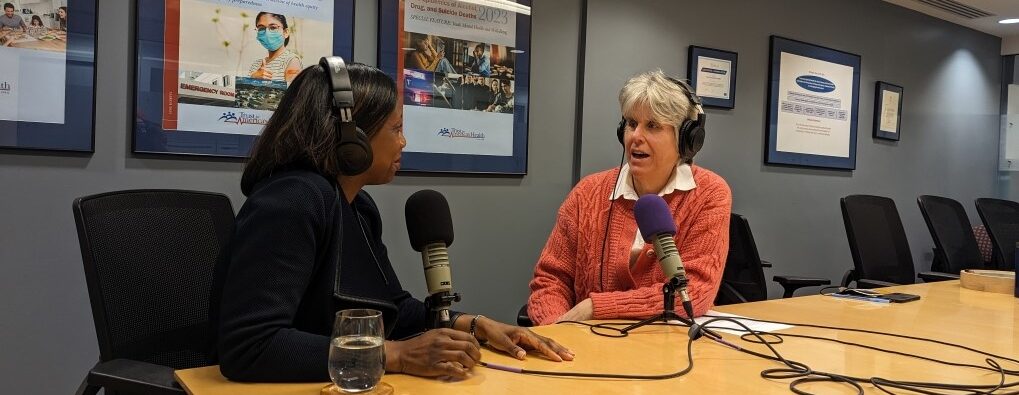Issue Category: Prevention and Public Health Policy
TFAH’s President and CEO Dr. Gracia Discusses the Significance of Dr. Martin Luther King Jr. Day & National Day of Racial Healing
(Washington, DC – January 15, 2024) – This week TFAH’s President and CEO, Dr. J. Nadine Gracia and Director of Strategic Communications and Policy Research Rhea Farberman discussed the significance of two important observances, Dr. Martin Luther King Jr. Day and the National Day of Racial Healing. The conversation focused on the intersections between Dr. King’s mission to advance social justice and TFAH’s work to promote optimal health. Also discussed were the ways in which structural racism creates barriers to good health for many people of color and the policy actions needed to dismantle those barriers.
“What we know, especially in thinking about this in terms of Dr. Martin Luther King, Jr. Day and the National Day of Racial Healing, is that for too many people of color and communities of color there has been, over many decades, a disadvantage in terms of access to health promoting resources.”
“We have to act with a sense of urgency because the health, well-being and prosperity of our nation depends on it. That’s the call that I believe Dr. King would challenge us to continue, to strive for and not relent. That’s his legacy to us, to ensure that everyone us the opportunity to reach their full potential for health.”
Dr. J. Nadine Gracia
President and CEO
Trust for America’s Health
“Listen to the full conversation”
Over 110 Organizations Call on Senate to Oppose Cuts to Prevention Fund
(Washington, DC – September 20, 2023) – Trust for America’s Health, American Public Health Association, Association of Public Health Laboratories, Big Cities Health Coalition, Campaign for Tobacco-free Kids, Council of State and Territorial Epidemiologists, National Association of County and City Health Officials, and more than 100 other organizations representing public health, healthcare, research, social services, and other sectors, today released a letter to the Senate Health, Education, Labor, and Pensions (HELP) Committee opposing a committee proposal to cut $980 million from the Prevention & Public Health Fund (“the Prevention Fund”) to pay for other health legislation.
The Prevention Fund is a critical source of funding for the Centers for Disease Control and Prevention and other agencies across Health and Human Services. The Prevention Fund invests in states and communities across the nation to strengthen systems and the workforce that allow us to provide immunizations, detect and control outbreaks, and prevent illness and early deaths from tobacco and chronic diseases. It supports activities outside one’s doctor’s office – separate and distinct from individual health concerns and treatments.
In an already challenging budget environment, this would further endanger the health of Americans. These cuts would impact not only health programs, but also labor and education, as it will leave a significant gap in base appropriations for the Labor-HHS-Education spending bill that will need to be backfilled. This pay-for has far reaching consequences for all ofthe programs that fall under the spending bill’s purview.
The letter in part reads:
“The nation can no longer afford to underfund public health…. Despite spending more than any other high-income nation on treating disease, the U.S. has substantially worse health outcomes, with life expectancy declining in recent years. Now is the time to invest in public health and prevention…
Cuts to the Prevention Fund will translate into funding shortfalls in programs that states have long relied upon to keep their residents healthy and safe. In its first 14 years (FY2010–23), the Prevention Fund has invested more than $12.3 billion in resources to states, localities, and tribal and community organizations in support of critical prevention and public health programs. These investments include the 317 immunization program that enables prevention of outbreaks, epidemiologists and public health laboratory grants in every state and territory to detect and investigate outbreaks and prevent further infections, the Preventive Health and Health Services (Prevent) Block Grant that enables states and localities to address their most pressing health concerns, supporting cancer screenings, and other critically important programs. Across the U.S. Department of Health and Human Services, the Prevention Fund supports programs such as suicide prevention, Alzheimer’s disease prevention, and chronic disease self-management.
Funding prevention not only saves lives, but it also saves money. The Prevention Fund’s Tips from Former Smokers Campaign alone saved an estimated $7.3 billion in smoking-related healthcare costs from 2012 to 2018 and helped more than one million Americans quit smoking for good. Public health funding has not kept up with the range of threats that public health must address. For many of these conditions, we know what works, but public health does not have the resources to address these growing health threats.”
The full text of the letter is linked here.
Information about the Prevention and Public Health Fund can be found here.
Organizations Joining the Letter:
ADAP Advocacy
American Academy of Pediatrics
American Association on Health and Disability
American College of Clinical Pharmacy
American College of Obstetricians and Gynecologists
American College of Physicians
American College of Preventive Medicine
American College of Sports Medicine
American Heart Association
American Lung Association
American Public Health Association
American Society for Microbiology
American Society on Aging
American Statistical Association
Association for Prevention Teaching and Research
Association for Professionals in Infection Control and Epidemiology
Association of American Medical Colleges
Association of Immunization Managers
Association of Maternal & Child Health Programs
Association of Pathology Chairs
Association of Public Health Laboratories
Association of Schools and Programs of Public Health
Association of State and Territorial Health Officials
Asthma and Allergy Foundation of America
Big Cities Health Coalition
CAEAR Coalition
Campaign for Tobacco-Free Kids
Center for Advocacy for the Rights and Interests of Elders (CARIE)
Children’s Environmental Health Network
Christian Council of Delmarva
City-County Health District
Colorado Public Health Association
Community Access National Network
Connecticut Public Health Association
Cook County Department of Public Health
Council of State and Territorial Epidemiologists
Dorchester County Health Department
Early Impact Virginia
Endocrine Society
Eta Sigma Gamma
Foundation for Healthy Generations
Futures Without Violence
GLMA: Health Professionals Advancing LGBTQ+ Equality
GO2 for Lung Cancer
Green & Healthy Homes Initiative, Inc
Health Promotion Consultants
Healthy Weight Partnership Inc.
HIV Medicine Association
HLN Consulting, LLC
Illinois Society for the Prevention of Blindness
Immunize.org
Institute for Public Health Innovation
International WELL Building Institute
Johns Hopkins Center for Health Security
Kansas Breastfeeding Coalition
Kentucky Voices for Health
Kids and Car Safety
Lakeshore Foundation
Linn County Public Health
Maine Public Health Association
March of Dimes
Marked By Covid
MaryCatherine Jones Consulting, LLC
Mel Leaman Free Clinic
Mental Health America
Minnesota Public Health Association
NASTAD
National Alliance of Public Health Students and Alums
National Association of Chronic Disease Directors
National Association of County and City Health Officials
National Association of Social Workers
National Center for Healthy Housing
National Center on Domestic and Sexual Violence
National Network of Public Health Institutes
National Nurse-Led Care Consortium
National Prevention Science Coalition
Nemours Children’s Health
New Jersey Public Health Association
New York State Public Health Association
Oregon Coalition of Local Health Officials
Peggy Lillis Foundation
Pennsylvania Public Health Association
Population Association of America
Prevent Blindness
Prevent Blindness Georgia
Prevent Blindness Ohio
Prevent Blindness Wisconsin
Prevent Child Abuse America
Prevention Institute
Public Health Foundation
Public Health Institute
Redstone Global Center for Prevention and Wellness
Resolve to Save Lives
RiverStone Health
Safe States Alliance
Society for Healthcare Epidemiology of America
Society for Maternal-Fetal Medicine
Society for Public Health Education
Society for Women’s Health Research
Sound Generations
Sound Generations – Project Enhance
Spina Bifida Association
Task Force for Global Health
The 317 Coalition
The Foundation for Sustainable Communities
The Gerontological Society of America
Trust for America’s Health
USAging
Vaccinate Your Family
Voices for Vaccines
Washington State Association of Local Public Health Officials
Washington State Public Health Association
Well-Being and Equity in the World
Wisconsin Public Health Association
YMCA of the USA
The Impact of Chronic Underfunding on America’s Public Health System: Trends, Risks, and Recommendations, 2023
Statement for the record by TFAH President & CEO J. Nadine Gracia for House Energy & Commerce Health Subcommittee Hearing on Legislative Solutions to Bolster Preparedness and Response for All Hazards and Public Health Security Threats
TFAH Comments on Proposed OMB Regs on Race & Ethnicity Data
TFAH Statement on the Braidwood Management v. Becerra Case
(Washington, DC – March 30, 2023) – Trust for America’s Health (TFAH) is deeply concerned about the recent ruling in the Braidwood Management v. Becerra case. This decision could restrict millions of Americans’ access to free preventive services that save lives and reduce healthcare costs. As a non-partisan public health policy, research, and advocacy organization dedicated to health promotion and disease prevention, we know the evidence shows that access to prevention is critical for the health and well-being of individuals and families. Coverage of preventive services without patient cost sharing means doctors detect cancers earlier. It means people get the help they need to quit smoking, families receive obesity prevention counseling, and health care providers can screen for behavioral health concerns like depression. Research shows that out-of-pocket costs are a barrier for people to receive life-saving preventive services, and they are an important tool for reducing health disparities. Our nation spends trillions of dollars on treating disease, but only a small fraction of those dollars are used to prevent people from getting sick in the first place. If this decision stands, it will be a step backward for the goal of achieving optimal health for every person and community.
COVID-19 and Drug Overdose Deaths Drive U.S. Life Expectancy Down
(Washington, DC – January 17, 2023) — Data released by the Centers for Disease Control and Prevention in December 2022 showed that U.S. life expectancy decreased from 77 years in 2020 to 76.4 years in 2021, the second consecutive year that U.S. life expectancy decreased. The last time the U.S. experienced a two-year decrease in life expectancy was during World War II.
Age-specific death rates from 2020 to 2021 increased for all age groups other than infants less than one year old. American Indian and Alaska Native females experienced the largest increase in death rates, jumping 7.3 percent in 2021. Lower life expectancy for some populations groups, disproportionately among people of color, have been attributed to the structural inequities and barriers to optimal health that those communities experience.
Heart disease remained the leading cause of death in the U.S. during 2021 followed by cancer and COVID-19. In addition, drug overdose accounted for over a third of all unintentional deaths. During 2021, 106,699 people died in the U.S. due to a drug overdose, a 14 percent increase in the overdose death rate over 2020.
“These data underscore the importance of TFAH’s work to advance public health, prevention, and health equity,” said TFAH President and CEO J. Nadine Gracia, MD, MSCE. “The COVID-19 pandemic has highlighted the impact of social and economic conditions on people’s health and a community’s ability to be resilient during an emergency. TFAH will remain steadfast in advocating for policies that promote optimal health and well-being for every person and community. Among our priorities are supporting policies and programs that will strengthen the nation’s public health workforce and data systems; investment in substance misuse and suicide prevention including school-based mental health services and primary prevention programs; increased investments in chronic disease prevention programs including obesity prevention; and addressing the social determinants of health.”
Learn more about the causes of declining U.S. life expectancy in this TFAH issue brief: U.S. Experienced Steepest Two-year Decline in Life Expectancy in a Century – TFAH
For more on TFAH’s recommendations to improve the nation’s emergency preparedness: Ready or Not 2022: Protecting the Public’s Health from Diseases, Disasters, and Bioterrorism – TFAH
For more on TFAH’s recommendations on needed investments in the nation’s public health system: The Impact of Chronic Underfunding on America’s Public Health System: Trends, Risks, and Recommendations, 2022 – TFAH
For more on TFAH’s recommendations on addressing the nation’s drug, alcohol and suicide crisis: Pain in the Nation 2022: U.S. Experienced Highest Ever Combined Rates of Deaths Due to Alcohol, Drugs, and Suicide During the First Year of the COVID-19 Pandemic – TFAH
For more on TFAH’s recommendations to address the nation’s obesity crisis: State of Obesity 2022: Better Policies for a Healthier America – TFAH



